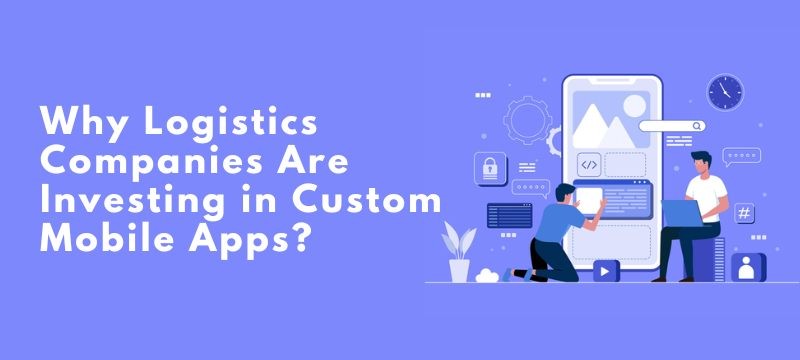In a world where packages travel faster than ever and consumer expectations continue to rise, logistics companies find themselves in a constant race against time and competition. Whether it’s tracking shipments, managing warehouses, or optimizing delivery routes, efficiency is everything. This is exactly why custom mobile apps are no longer a luxury in logistics—they’ve become a necessity.
So, what’s behind the growing interest in mobile apps among logistics providers? Let’s explore the reasons why more and more logistics companies are making strategic investments in tailored mobile applications—and why it’s paying off.
The Need for Real-Time Visibility
One of the major pain points in logistics has always been visibility. Without a centralized, real-time view of shipments, companies struggle to respond proactively to delays, customer inquiries, or last-minute changes. Custom mobile apps help bridge that gap.
With features like real-time tracking, digital proof of delivery, and live location updates, these apps empower both dispatch teams and customers with up-to-date information. Drivers can update their status instantly, warehouse teams can coordinate better, and customers know exactly when to expect their deliveries.
Enhanced Communication Across the Chain
Logistics isn’t a single process—it’s a chain of interconnected events, teams, and touchpoints. From the warehouse floor to the final mile of delivery, communication breakdowns can create costly delays. A custom mobile app enables seamless interaction between drivers, managers, support teams, and even customers.
Push notifications, in-app messaging, and alerts ensure that no one is left in the dark. Instead of relying on phone calls or spreadsheets, logistics professionals can now handle operations through their smartphones with higher speed and accuracy.
Route Optimization and Fuel Efficiency
One of the most compelling reasons for logistics companies to go mobile is route optimization. With fuel prices fluctuating and urban traffic only getting worse, optimizing delivery routes is critical for saving time and money.
Custom logistics apps often integrate GPS and machine learning algorithms to provide drivers with the fastest, most fuel-efficient routes. They can adjust in real-time for traffic conditions, weather updates, or sudden road closures. This not only reduces delivery time but also contributes to a company’s environmental goals—something more businesses are paying attention to today.
Improved Data Collection and Analytics
Imagine trying to analyze delivery patterns or customer complaints using handwritten notes or Excel sheets. It’s time-consuming and highly prone to human error. A custom mobile app can automatically collect and organize this data, creating a goldmine of insights.
Managers can access dashboards that reveal delivery time trends, driver performance, and even the reasons for failed deliveries. These insights help fine-tune logistics operations, improve customer satisfaction, and identify areas of cost savings. In the long run, data-driven decisions powered by mobile apps give logistics companies a competitive edge.
Streamlined Compliance and Documentation
Logistics involves more paperwork than most industries—bills of lading, shipping manifests, customs forms, safety checks, and more. A misplaced document can disrupt an entire shipment.
Custom mobile apps can digitize these documents, attach them to orders, and ensure they’re accessible anytime, anywhere. They also simplify compliance with industry regulations and make audits less stressful. With features like e-signatures, document scanning, and secure cloud storage, logistics providers can focus more on movement and less on management.
Scalability and Flexibility
Every logistics company is different. While some may focus on international freight, others specialize in last-mile delivery or warehouse management. Off-the-shelf apps rarely fit all needs, and that’s where custom solutions shine.
A well-designed mobile app can scale with your business. Whether you’re expanding your fleet, entering new markets, or integrating with third-party software, a custom app can adapt to your evolving requirements. This flexibility ensures that the technology remains an enabler—not limited to one.
Interestingly, many logistics firms are working with local tech partners who understand their operational challenges. Collaborating with a Mobile Application Development Company in Delhi, for instance, has allowed several logistics businesses to build cost-effective, scalable apps tailored to regional and global needs.
Better Customer Experience
At the end of the day, customer satisfaction is what drives business success. Logistics companies that use custom mobile apps can offer better customer experiences through features like real-time shipment tracking, automated notifications, easy re-scheduling, and instant customer support.
These features reduce customer anxiety around delivery and create a sense of transparency and trust—qualities that are essential in today’s competitive market.
Final Thoughts
The logistics industry is undergoing rapid transformation, and mobile apps are at the heart of it. From reducing delays and enhancing communication to improving data analytics and customer satisfaction, the advantages are far-reaching.
Custom mobile apps are not just tech add-ons—they are strategic tools that help logistics companies stay agile, competitive, and customer-focused in an increasingly digital world. Whether it’s a startup or an established logistics provider, the move toward mobile is no longer a question of “if,” but “when.”
And with the right development partner Sofrik—be it a seasoned team or a trusted Mobile Application Development Company in Delhi—the path to innovation is more accessible than ever.



